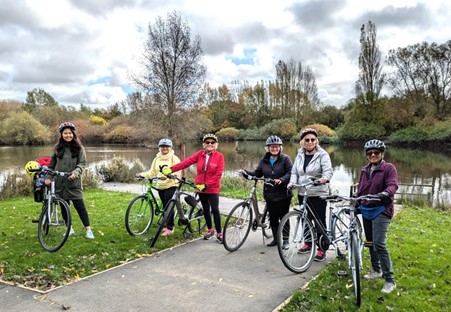Maybe you’re wondering what one has to do with the other?
All shall be revealed, dear reader.
I am in my crone years. Recently I decided to revive my adult-acquired bicycling skills that hadn’t been practiced for over 20 years. Through friends, I heard about a sporting hub nearby that runs weekly classes for women & girls.
Off I went with helmet, bikes provided there. We were a little group of about 8 punters (clients, learners) and 3 leaders. The tracks were lovely, very safe as no traffic, thoughtful gradients and really nice surroundings. It took me several attempts just to set off and stay on the bike! How can something that’s supposed to be so natural feel so scary?! I didn’t have the confidence to do sharp turns so stuck with the gentle ones, felt great when I safely made it thru cones and things J and didn’t fall once – yay!
After each “lap” around the full track I stopped at ‘base camp’ for water, chat and a general catching of breath. I noticed that all of us learners were women of colour. And that our lovely British Cycling instructors were white women. Of course, this wasn’t mentioned, it could have appeared insensitive if the trainers had pointed it out. I couldn’t help raising it in a humorous way, which then prompted a few stories from some of the other global-majority women, Pakistan and Nigeria as I remember particularly.
I felt relieved not to be the only one who hadn’t been taught cycling as a kid, to understand a bit more about this phenomenon of gendered bicycling ability. Another layer or two of patriarchy and culture peeled back in sorority with other “skin folk” as we all wobbled around together!
Of course, you realise that my experience and that of the other women is not reflective of all women from any specific heritage. Culture remains messy, complex and rewarding to be curious about. I am from a “Syrian Christian” family background in Kerala, India. Our culture can be more patriarchally oriented than say the Hindu Nairs (or Nāyars) of Kerala, who have traditionally followed a matrilineal system, giving women agency and independence. (This began to fall apart with the Christian missionaries and the colonial project of ‘civilisation’ into nuclear family values, but that’s not the topic of this post.) I’ve heard stories of some of my Nair friends being taught to cycle as girls, and even to swim – thrown into the village tank with coconuts strapped to the upper body as floats! Swimming is another skill I picked up only in my thirties, and driving. Another story is from a teacher in Sweden who was assigned the extra task of teaching her teenage female immigrant students how to swim, which she found very rewarding. I am happy for greater independence, agency and body movement for all of us, not just women!
So – other than being personal and a bit self-indulgent perhaps – I invite you to notice the manifestations of culture all around you, and be curious not judgmental. Use your observations to initiate meaningful dialogue, learn about your team mates and their experiences.
I’d imagine that almost all team development approaches (I am most familiar with Team Emotional Intelligence and Lencionis's 5 Dysfunctions frameworks) invite consciously building good working relationships among team members, wider than just the ‘task’. The increasing complexity of teamwork means that teams are unlikely to achieve high performance through chance or the skills of a good team leader. All work happens through and with people, so the greater the relationality and trust, the better the work goes. Understanding a little about our team members at a personal level helps build trust and use disagreement or divergence in views productively.
Of course, obstacles emerge – as always – and we live in VUCA times, needing to be prepared without quite knowing what we’re preparing for. The emotional, mental, pro-social capacities are even more important in this landscape.
So – what surprises you as you learn more about the folks you work with? How does it impact working together?

